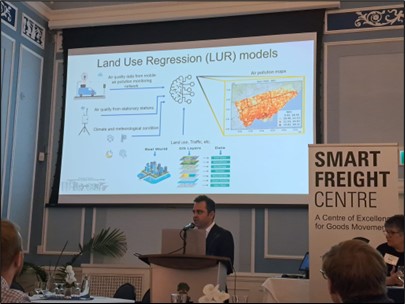Stories
Smart Freight Centre Symposium, November 2023
Positive Zero Transport Futures graduate students presented original research at the 2023 Smart Freight Centre Symposium at the University of Toronto on November 10, 2023. The day comprised three sessions: Transforming our Cities for Freight, Transforming Freight in our Communities, and Transforming Technology in Freight.

PhD candidate Sara Torbatian shared her work “Societal co-benefits of zero-emission on-road freight movements.” Using an integrated modelling framework developed for the Greater Toronto and Hamilton Area (GTHA), Sara examined the air quality and health implications of increased light, medium, and heavy-duty truck electrification. This was done by combining a chemical transport model with spatially and temporally resolved commercial vehicle movements in the GTHA. The analysis was also conducted through an environmental justice lens, evaluating how truck electrification impacts the most disadvantaged communities. The work has concluded that electrification of heavy-duty trucks reduces air pollutant concentrations, and the highest reductions occur in communities with the highest material deprivation.

Yunhong (Doris) Tian shared her work “Image Recognition for Commercial Vehicle Counting & Classification.” In response to a gap in methods to understand the spatial and temporal distribution of trucks, Doris is exploring how traffic video-camera technology can be adapted to estimate truck movements across an entire network. This is done through a combination of traffic simulation, statistical analysis, primary data collection and machine learning. This framework will be used to develop a sampling protocol capable of estimating truck counts on every urban road despite sampling location limitations.

Milad Saedi presented his work “Harnessing the routes of delivery to map urban air quality.” The study explores using mobile air quality samplers installed on courier trucks to develop a model capable of predicting fine particulate matter in downtown Toronto. Using a land use regression model developed with XGBoost algorithms, Milad was able to combine the mobile monitoring from courier trucks with land use, meteorology, and emissions to build robust prediction models. The study’s findings will provide insight into optimizing predictor selection, handling outliers, and the potential of utilizing mobile monitoring to develop enhanced spatial resolution of air quality in urban areas.
This was the 5th annual Smart Freight Centre Symposium, bringing together government, industry, and nonprofits speakers. The symposium was chaired by Dr. Matthew Roorda, the Canada Research Chair in Freight Transportation and Logistics and a professor in the Department of Civil & Mineral Engineering at the University of Toronto.